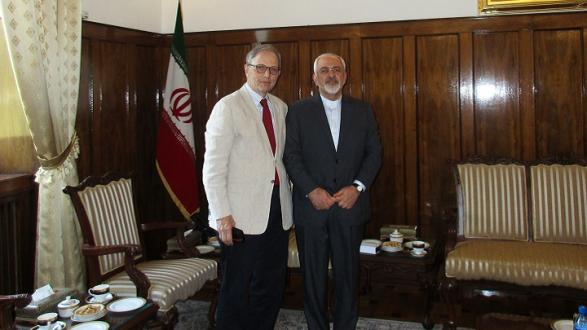On the heels of the nuclear deal reached between Iran, the United States, and five other world powers, Pacific Council CEO Dr. Jerrold D. Green traveled to Iran where he met with Foreign Minister Javad Zarif, among others.
Read some of the key takeaways from the visit:
On the reason for the visit ...
“I wanted to explore the possibility of organizing a Pacific Council delegation to visit Iran. We send delegations all around the world, generally to two flavors of countries: places where our members are or have been ambassadors like China, France, Argentina, Germany, and Indonesia (ASEAN which is based in Jakarta), and to less commonly visited places like Afghanistan, Iraq, South Sudan, North Korea, and Cuba. Iran fell somewhere in the middle.”
On the efficacy of economic sanctions ...
“There is a great deal of boasting in some parts of Washington about the efficacy of economic sanctions against Iran. What the Iranian leaderships says, for obvious reasons, is that the sanctions have had little impact, and what Tehran is doing is not a reaction to the sanctions but rather a rational calculated decision about what is in Iran's best interest. I must say that, wandering the country widely, there was little evidence of economic sanctions having a major impact. People are driving cars, they are eating in restaurants, they are shopping in stores, and even the Black & Decker store was full of Black & Decker stuff presumably brought in from Dubai or elsewhere. Although we do know for a fact that the sanctions have had an impact, I did not see any widespread evidence of shortages."
On the nuclear deal ...
“The nuclear deal, for many people, is all about centrifuges and physics, but at the end of the day it’s as much about geopolitics and philosophical issues as it is anything else.”
“Those who support the deal tend to believe the glass is half-full, and that Iranian political behavior will be improved as a result of the re-introduction into the global economy. For those who oppose the deal, the glass is half-empty, and no matter what happens with Iran economically, the country is not going to change its spots, and it will always be unremittingly opposed to the West and to Israel."
“Much of the fate of the deal, should it be passed by Congress, is going to be a result of political decisions. The one thing that unites everybody - including the Iranians themselves - is the inability to predict what's going to happen with Iranian politics. Iranian politics is designed in a way that even the Iranian political leadership itself does not know everything that is going on. It is designed as an intentionally opaque system."
On whether the United States is "abandoning" the Middle East ...
“Secretary Kerry would not have spent his entire term working on first the Arab-Israel issue and then the Iran issue if the United States was abandoning the Middle East. Everybody thinks that another part of the world is getting primacy, but that’s not the case. The United States is a great power with global obligations. If you really want to talk about a forgotten region, let’s talk about Latin America, which regularly gets the short end of the policy stick.”
On meeting with Foreign Minister Javad Zarif ...
“[Foreign Minister Zarif] was not wildly optimistic that the deal would pass the United States Congress. He didn't make a definitive statement, but he expressed certain skepticism. This was before Senator Schumer came out against the deal.”
“It’s important to understand the constraints on [Zarif]. The naysayers in Iran control the military, the intelligence services, the Revolutionary Guard, and they certainly control significant elements of the economy. For him, there’s a lot of uphill sledding in terms of selling this deal to the rest of the Iranian people.”
“Those in Iran who oppose the deal are very, very weighty. A lot of the conversation is ugly, it’s bitter.”
“Just as Obama is trying aggressively to sell this deal to Congress and to the American people, against very weighty forces that are opposed to it, in Iran a similar dynamic is underway. Those who oppose the deal are not simply inconsequential political actors, but rather the military, intelligence service people, and others. So Zarif really has his work cut out for him. The fact that he is an American educated Ph.D., surrounded by a cabinet full of other American educated Ph.D.s, negotiating a deal with the United States, is something that has not been missed by the opponents of the deal, who are obviously unhappy about it."
“If the deal passes, its success will be determined by geopolitical decisions made by the Iranians about what kind of world they want to live in - about what kind of country they wish to live in. Some people are optimistic about that and they support the deal, others are pessimistic about that and they oppose the deal. The real answer is: nobody knows. That, I think, is why this is so challenging."
____________________
Dr. Jerrold D. Green is the President and CEO of the Pacific Council on International Policy.




